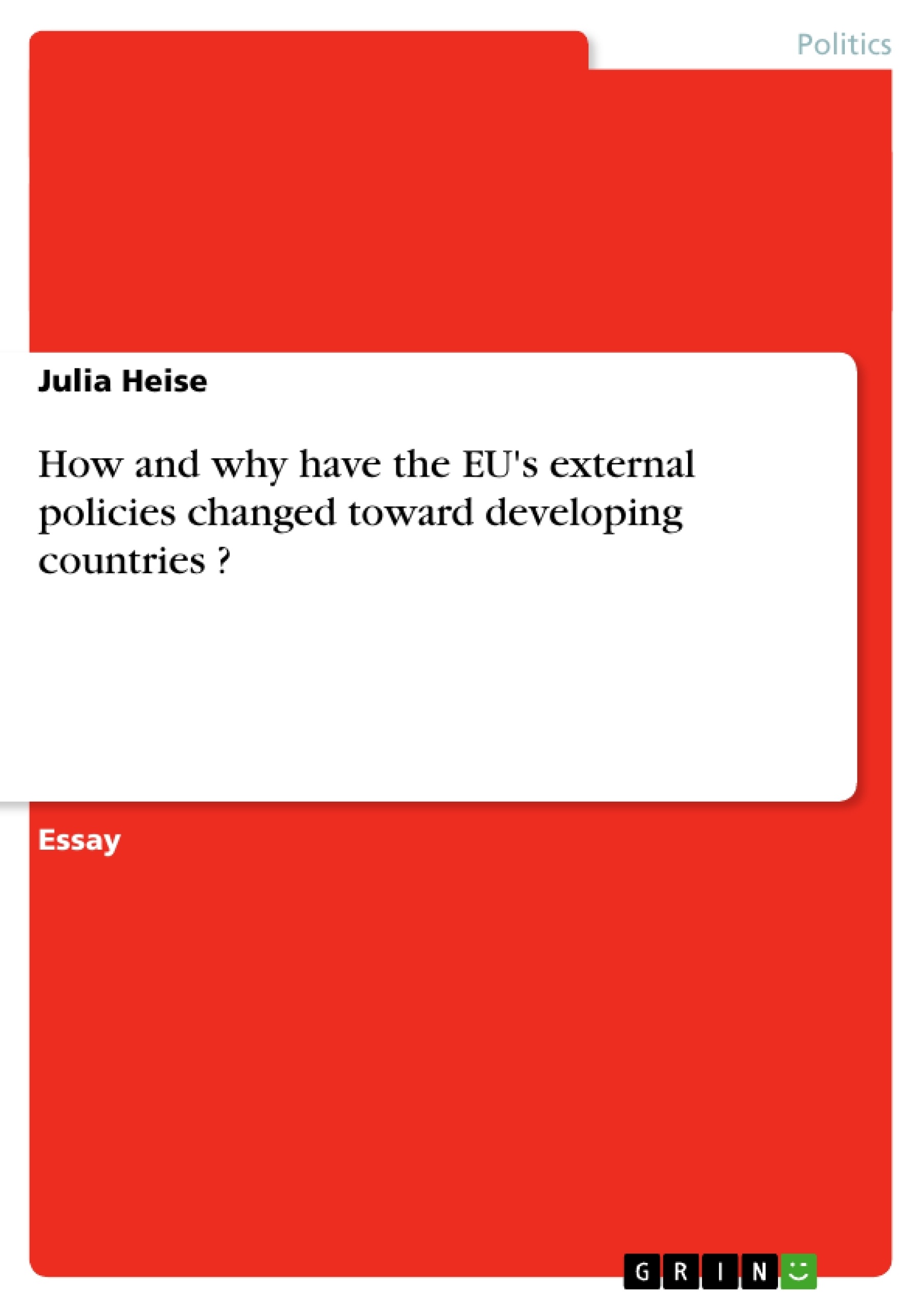Relations with developing countries are a long-established part of the European Union’s external affairs and the “(…) EU’s contributions to international development are not only unsurpassed but have become the standard against which the rest of the world measures itself and is judged.” (Babarinde, 1998: 128).1 For most of the past 40 years the ACP-countries have been at the heart of EU-development affairs. Yet, several factors, mainly caused by the end of the Cold War, contributed to the transformation of the Union’s development policy in general. The following paper analyses how and why the EU’s external policies have changed towards developing countries, thereby focusing on the ACP-EU relationship. Section one discusses the evolution of the Union’s development policy. The Yaoundé- and Lomé-agreements are examined in the subsequent sections. Section four then analyses the developments that led to the most fundamental transformation of the Union’s development policy- the Cotonou Agreement, which will be subject to the last section. The paper concludes by evaluating the transformation of EU-development policy in general. 1 The Union’s significance as an international actor regarding development policy is for example underlined by agreements with the World Bank or the United Nations Development Programme to produce common development strategies. (Bretherton and Vogler, 1999: 109). In the late 1990s the EC and its Member States accounted for 60 percent of the world aid. Also see European Union (2000) and Grilli (1993).
Inhaltsverzeichnis (Table of Contents)
- Evolution of EU-development policy
- From Yaoundé I to Lomé III
- Lomé IV
- Fundamental changes
- The Cotonou-agreement
Zielsetzung und Themenschwerpunkte (Objectives and Key Themes)
This paper aims to analyze the transformation of the European Union's (EU) development policy towards developing countries, focusing on the ACP-EU relationship. It explores how and why the EU's external policies have shifted over time, considering the influence of factors like the end of the Cold War.
- Evolution of EU-development policy
- The role of the Yaoundé and Lomé agreements
- Impact of the Cold War's end
- The significance of the Cotonou Agreement
- The EU's role as a global development actor
Zusammenfassung der Kapitel (Chapter Summaries)
- Evolution of EU-development policy: This section examines the development of the EU's explicit development policy, highlighting the key factors that influenced its emergence, including the Common Agricultural Policy (CAP) and the need to accommodate colonial interests.
- From Yaoundé I to Lomé III: This section focuses on the first formal treaty of association between the European Community (EC) and the AASM-countries, the Yaoundé Convention, and the subsequent developments that led to the Lomé Agreements. It discusses the changing dynamics in the relationship and the evolving roles of the associated countries.
- Lomé IV: This section explores the key features of the Lomé IV Agreement, highlighting the modifications made to the previous agreements and the evolving nature of the EU-ACP relationship.
- Fundamental changes: This section analyzes the significant shifts in the EU's development policy, particularly the impact of the Cold War's end on the EU's priorities and the ACP-EU relationship.
Schlüsselwörter (Keywords)
The key themes and concepts explored in this paper include the EU's development policy, ACP-EU relations, the Yaoundé and Lomé agreements, the Cotonou Agreement, the impact of the Cold War, and the EU's role as a global development actor.
Frequently Asked Questions
How has the EU's development policy evolved over the last 40 years?
The policy has shifted from early colonial-influenced associations like the Yaoundé agreements to more comprehensive frameworks like the Lomé Conventions and finally the Cotonou Agreement, reflecting changing global political landscapes.
What was the impact of the Cold War's end on EU external policies?
The end of the Cold War was a major catalyst for transformation, leading the EU to reassess its strategic priorities and move toward the more fundamental changes seen in the Cotonou Agreement.
What are the ACP-EU relations?
These are the relations between the European Union and the African, Caribbean, and Pacific (ACP) Group of States, which have historically been at the heart of the EU's development affairs.
What is the significance of the Cotonou Agreement?
The Cotonou Agreement represents one of the most fundamental transformations of the Union’s development policy, introducing new dimensions to the partnership beyond just aid and trade.
Is the EU a significant actor in international development?
Yes, the EU and its Member States have historically accounted for a vast portion of world aid (e.g., 60% in the late 1990s), setting standards for international development contributions.
- Quote paper
- Julia Heise (Author), 2005, How and why have the EU's external policies changed toward developing countries ?, Munich, GRIN Verlag, https://www.grin.com/document/39094



